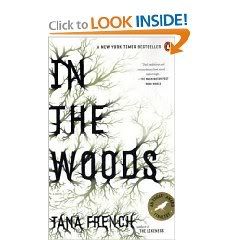French's atmospheric debut finds the narrator, a young detective on Dublin's Murder Squad, drawn back into the childhood mystery/trauma/tragedy that led him to become a detective in the first place (though he denies it). In 1984, when Adam Ryan was 12, he and his two best friends, Peter and Jamie, went into the wood at Knocknaree, as they had done many times before. But that day only Adam came out. He was found catatonic by frantic searchers - his shoes filled with Jamie's blood and his memory gone. Now his name is Rob, his accent is that of the British boarding school he was sent to, and his best friend is another tomboyish girl like Jamie, his partner Cassie. They've caught a murder case in Knocknaree - a 10-year-old girl found on an ancient altar stone at an archaeological dig at the edge of the wood. Circumstance and evidence provide a tenuous link to the old case. Though it could cost them both their jobs, Rob keeps his connection secret. Cassie has long known his history and, while she grows increasingly wary of his judgment, she keeps silent, while they delve into the old case and look for parallels with the new. But there is another possibility. The dig is on the site of a future motorway and while the ancient finds are many, the politicians are immovable. The dead girl's father is head of the local anti-motorway group and has received several calls threatening his family. Rob and Cassie acquire a third member of the team, Sam, an earnest detective with an uncle in politics. It's his job to probe the motorway angle. While Sam's efforts don't dovetail much with theirs, at least at first, the three make a habit of long evenings going over the case together at Cassie's, fueled with simple meals, drink and youthful ambition. French's prose is rich and vivid with metaphor and visuals and flashes of youthful intensity. Her narrator's mind is a self-conscious place and grows more so. The story is told from the vantage point of afterwards - the narrator knows how it turned out and examines his thoughts and actions as he recounts the story. The result is mixed. A police procedural of psychological suspense, the narration becomes increasingly wobbly, unreliable, murky. French handles the nuances of this and the continuing investigation well, but it goes on too long. Eventually the reader gets tired of Rob's emotional fraughtness, his slide into recklessness, his errors of judgment. Still, her prose is electric. Interaction makes her character explorations visual and believable, mostly. Rob and Cassie's closeness throws sparks, though there's a bit too much hair ruffling. French's debut is intense and readers will look forward to more from her.
Books
- Eclipse
- Secret son
- New Moon
- Safer
- American Lion
- Team Of Rivals
- The Help
- Serena
- Down River
- Angel and Demons
- The White Tiger
- The Soloist
- Divine Justice
- Healing Brain
- Columbine
- Forever War
- Dead And Gone
- King Of Lies
- Red Mars
- Yankee Years
- Cook Yorself Thin
- Perfect Poison
- Drowning Ruth
- The Field
- Black and Blue
- Freakonomics
- Runaway Jury
- Layers
Archive
-
▼
2009
(314)
-
▼
May
(302)
- The Adobe Photoshop CS3 Book for Digital Photograp...
- Layers
- The Moment It Clicks
- Learning to See Creatively
- Understanding Exposure
- My Sister's Keeper
- Nineteen Minutes
- The Wedding
- A Walk to Remember
- The Notebook
- Message in a Bottle
- The Rescue
- Dear John
- The Choice
- Playing for Pizza
- The Chamber
- The Firm
- A Time to Kill
- The Runaway Jury
- The Client
- The Pelican Brief
- Skipping Christmas
- A Painted House
- The King of Torts
- The Summons
- The Last Juror
- The Brethren
- The Street Lawyer
- The Testament
- The innocent man
- The Appeal
- The Associate
- First Family
- Long Lost
- The Scarecrow
- A Walk in the Woods
- Founding Brothers
- American Creation
- American Gospel
- American Lion Review
- From Colony to Superpower
- The Glorious Cause
- Freedom from Fear
- Battle Cry of Freedom
- Lincoln
- Team of Rivals
- Means of Ascent
- The Power Broker
- Gotham
- The Island at the Center of the World
- Mannahatta
- Quantum Success
- The Intention Experiment
- THE FIELD
- The Biology of Belief
- The Divine Matrix
- Your Immortal Reality
- A Course in Miracles
- Return to Love
- The Age of Miracles
- Happy for No Reason
- Sara, Book 3
- Sara, Book 2
- Sara, Book 1
- Money, and the Law of Attraction
- The Amazing Power of Deliberate Intent
- Ask and It Is Given
- The Secret
- The Law of Attraction
- The Astonishing Power of Emotions
- The Disappearance of the Universe
- A Course in Miracles
- Practicing the Power of Now
- Stillness Speaks
- A New Earth
- How to Love Yourself
- Stress-Free
- Overcoming Fears
- I Can Do It
- Receiving Prosperity
- Self-Esteem Affirmations
- Anger Releasing
- Love Yourself, Heal Your Life
- Heal Your Body
- You Can Heal Your Life
- It's Not What You've Got
- Unstoppable Me
- Being In Balance
- Getting in the Gap
- 10 Secrets for Success and Inner Peace
- Manifest Your Destiny
- Meditations for Manifesting
- The Power of Intention
- Your Erroneous Zones
- Change Your Thoughts - Change Your Life
- Tao of Jeet Kune Do
- The Warrior Within : The Philosophies of Bruce Lee
- The Official Guide for GMAT Review
- The Official Guide for GMAT Review
- Frommer's Paris 2007
-
▼
May
(302)
My favorites books © 2008 Por *Templates para Você*


